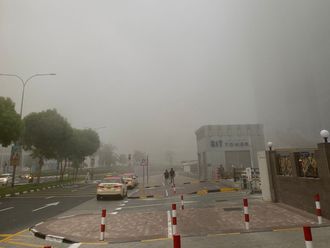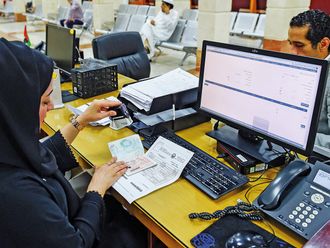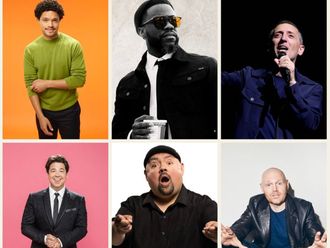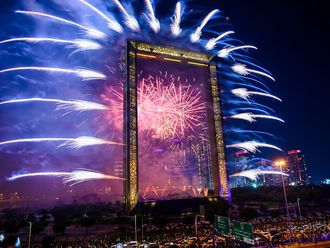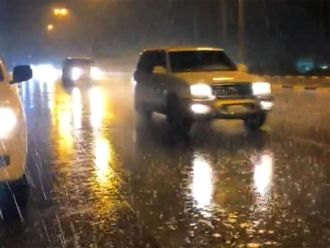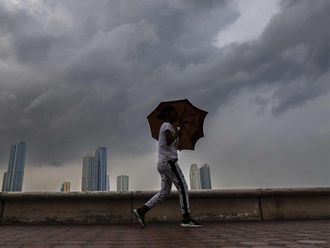Gulf News reporter Tanya Goudsouzian and photographer Sevag Davidian spent three weeks in Kurdish-controlled northern Iraq. They present here insights into the forces shaping Kurdish thinking as violent regime change appears imminent
Hero Talabani hardly represents the stereotypical Kurdish woman. She is neither locked away at home, nor does she keep any chickens.
This afternoon, she is wearing a fitted purple pantsuit and high heels. She is leaning over a computer, inspecting the layout of the latest edition of Sekhurma, a monthly Kurdish-language magazine featuring political and social satire.
One of the slogans included in last month's issue: "I would never die for my beliefs because I might be wrong."
The edgy humour takes on a different dimension when one considers the feisty 55-year-old spent the bulk of the 1980s by her husband's side in the mountains fighting for the Kurdish cause. Her husband is none other than Jalal Talabani, leader of the Patriotic Union of Kurdistan (PUK), one of two main Kurdish factions in northern Iraq.
During the years of resistance, she documented the peshmergas' (partisan fighter) trials and tribulations on an old VHS camera. In 1987, a British journalist offered to broadcast the footage in the UK.
"But there was no interest at the time," recalled Hero, who learned English by watching American movies. "With the Iran-Iraq war going on, the world did not want to hear anything negative about Saddam Hussain's regime."
Soon after it was broadcast, the Iraqi ambassador in London gave a televised interview, claiming the footage was fabricated, she said.
Today, Hero Khan (a title of respect) runs Kurd-Sat, a satellite television station, and Khak TV, one of nine local television stations in areas under PUK control. She also oversees the publication of Kurdish newspapers and magazines.
"Khak TV is privately-owned. We focus on human interest programmes, such as market prices, the rate of the dinar, and family matters," she said. "Kurd-Sat, on the other hand, is funded by the PUK. Still, no one interferes in our affairs. We have free reign. There is no political censorship in the programmes."
There is, however, an effort to limit the screening of violent movies, since many children are up late at night, she said.
Hero Khan has two sons, aged 30 and 25, who grew up in the care of her mother in London, far away from the chaos of armed resistance. Her youngest son was born in Beirut during the civil war. Her husband was forced to leave her side a day before and attend to urgent matters in Iran.
While she abhors the term "first lady", Hero Khan is considered a role model for young Kurdish women in Sulemanieh and other districts under PUK jurisdiction. She draws her own inspiration from Habsa Khan, an iconic Kurdish feminist, who initiated radical social changes in the 1950s.
"She went to the bazaar and tore off her headscarf," she said. "This was really scandalous in those days...".
Hero Khan herself is not one to pussyfoot around touchy issues. She has ostracised conservative religious figures with her outspokenness and her no-nonsense attitude.
One piquant cartoon in Sekhurma depicts, in the first box, a rural woman milking a cow; in the second box, the rural woman wearing a niqab; in the third box, a petrified cow running away.
"They don't like me much," said Hero, of Islamic leaders. "In the Friday sermons, they often deliver bitter diatribes about the television station, and sometimes we receive threats, so we double the security."
Recently, she wrote a controversial column in the local Khak magazine criticising the Islamists for attempting to Arabise the Kurdish region.
"Basically, what I wrote was that there is no need to oblige members of the Islamist party to change their Kurdish names into Arabic ones," she said.
"If someone's name is Kamran or Kawa, they are asked to change it. Why is it necessary to Arabise the names of their followers? Will God not listen to our prayers if we are Kurdish?"
In the same article, she blasted Islamists for obliging women to wear black cloaks and headgear.
"Our traditional Kurdish costumes are modest enough. The women wear long dresses and headscarves. Why is it necessary to Arabise our traditional dress?" she asked.
The Islamists promptly issued a reply to the article: "If this woman is so bent on preserving traditional Kurdish dress, why does she go around in Western clothes?"
Hero Khan laughed.
"I do wear Kurdish clothes when the occasion calls for it; and I wear Western clothes when it is appropriate," she said. "But in their reply, they did not say anything about the point I made about changing Kurdish names."
In addition to her work with the media, Hero Khan is also a patron of social work. Residents of areas under PUK jurisdiction enjoy a measure of social security, due in large part to her efforts.
There are cultural centres for working children to ensure they are not abused by their employers and their creative energies are channelled in constructive endeavours, such as music, art and sports. There are halfway houses for children, who are abandoned by their impoverished parents, as well as for women who have run away from domestic disputes.
As for future plans, Hero Khan feigned superstition: "I hate to say what I am going to do before I do it. What if it never happens?"
In spite of her professed disdain for politics - "you and your politics!" she often tells her husband - she did express an opinion over the future of Iraq.
"Whoever succeeds Saddam Hussain, what Baghdad needs is a leader who doesn't need to paste his picture all over the country!" she said, with a wry smile.
A 'first lady' with attitude
A 'first lady' with attitude


